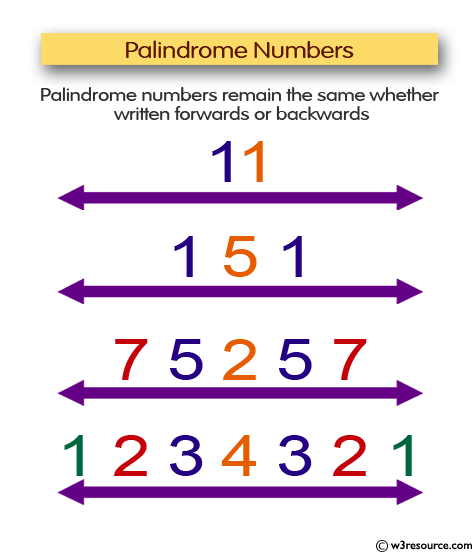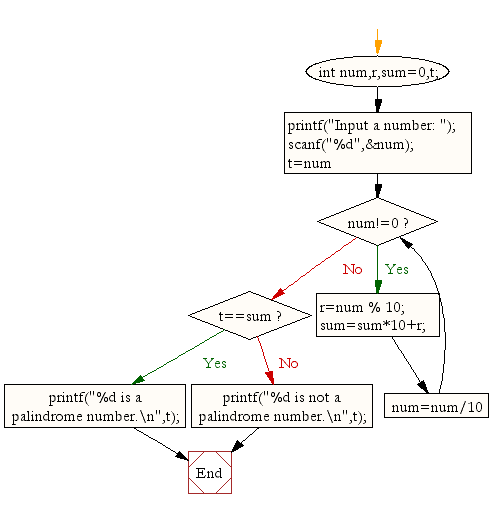C Exercises: Check whether a number is a palindrome or not
C For Loop: Exercise-38 with Solution
Write a program in C to check whether a number is a palindrome or not.
Pictorial Presentation:

Sample Solution:
C Code:
#include <stdio.h>
void main(){
int num,r,sum=0,t;
printf("Input a number: ");
scanf("%d",&num);
for(t=num;num!=0;num=num/10){
r=num % 10;
sum=sum*10+r;
}
if(t==sum)
printf("%d is a palindrome number.\n",t);
else
printf("%d is not a palindrome number.\n",t);
}
Sample Output:
Input a number: 121 121 is a palindrome number.
Flowchart:

C Programming Code Editor:
Improve this sample solution and post your code through Disqus.
Previous: Write a program in C to display the number in reverse order.
Next: Write a program in C to find the number and sum of all integer between 100 and 200 which are divisible by 9.
What is the difficulty level of this exercise?
Test your Programming skills with w3resource's quiz.
C Programming: Tips of the Day
Static variable inside of a function in C
The scope of variable is where the variable name can be seen. Here, x is visible only inside function foo().
The lifetime of a variable is the period over which it exists. If x were defined without the keyword static, the lifetime would be from the entry into foo() to the return from foo(); so it would be re-initialized to 5 on every call.
The keyword static acts to extend the lifetime of a variable to the lifetime of the programme; e.g. initialization occurs once and once only and then the variable retains its value - whatever it has come to be - over all future calls to foo().
Ref : https://bit.ly/3fOq7XP
- New Content published on w3resource:
- HTML-CSS Practical: Exercises, Practice, Solution
- Java Regular Expression: Exercises, Practice, Solution
- Scala Programming Exercises, Practice, Solution
- Python Itertools exercises
- Python Numpy exercises
- Python GeoPy Package exercises
- Python Pandas exercises
- Python nltk exercises
- Python BeautifulSoup exercises
- Form Template
- Composer - PHP Package Manager
- PHPUnit - PHP Testing
- Laravel - PHP Framework
- Angular - JavaScript Framework
- Vue - JavaScript Framework
- Jest - JavaScript Testing Framework
